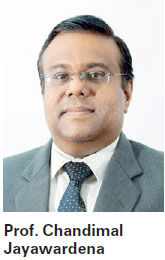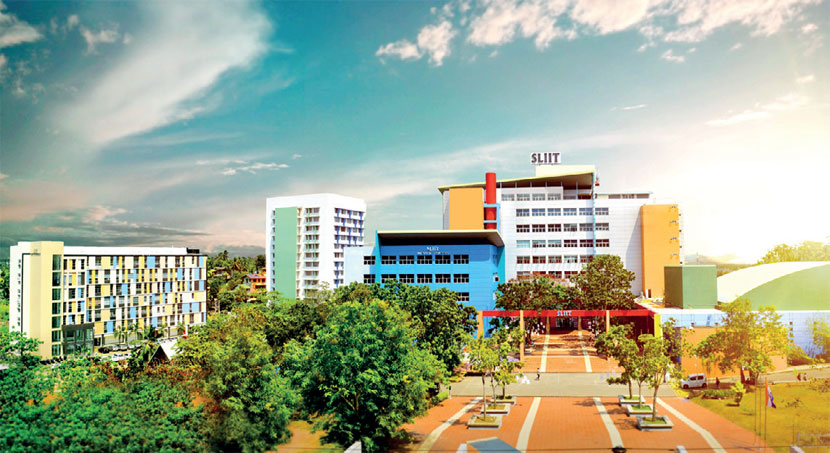A promising path to your Computing Carrier with our Excellence at SLIIT
 SLIIT interview with Prof. Chandimal Jayawardena, Dean, Faculty of Computing, SLIIT
SLIIT interview with Prof. Chandimal Jayawardena, Dean, Faculty of Computing, SLIIT
Q1 - Among many universities oper ating in Sri Lanka, what is the uniqueness of SLIIT?
SLIIT was established little less than 20 years ago. During the last two decades, the SLIIT was able to develop locally and internationally by a considerable magnitude. All educational programmes we introduced are based on the applied education and targets the job market. The SLIIT’s relationship with the business and industrial sectors has enabled the SLIIT to make this a success. The courses are designed to suite the job market requirements. All SLIIT programmes are updated on a regular basis and new programmes are launched when required to meet the job market demands. The efforts taken to enhance the soft skills of the students is another special aspect of the SLIIT. There are several bodies specifically designed to address this need. Another specialty of the SLIIT is the investment made on research in terms of the time, money and the commitment. Our aspiration is to become a world class research led university in ten years time.
Q2 - What are the faculties you have, and the academic streams cov ered at SLIIT?
SLIIT offers a broad range of degree programmes in the fields of Computing, Engineering, Business, Humanities and Sciences; both undergraduate and postgraduate. Most of these programmes are local degree programmes offered with UGC and Ministry of Higher Education approval. In addition to that there some foreign programmes conducted in affiliation with some recognized foreign universities as well. The Faculty of Computing, which is the largest faculty with more than 4000 students, offers seven degree specializations. They are Information Technology, Software Engineering, Computer Systems and Network Engineering, Information Systems Engineering, Interactive Media, Cyber Security, and Data Science.
The Faculty of Engineering, with around 2000 students, offers Electrical and Electronic Engineering, Civil Engineering, Materials Engineering, Mechanical Engineering, and Mechatronics Engineering specializations. The SLIIT Business school offers BBA (Hons) degree specializing in Business Management, Human Capital Management, Marketing Management, Accounting and Finance, Logistics and Supply Chain Management, Business Analytics, and Management Information Systems. The Faculty of Humanities & Sciences is a newly established faculty and planning to offer programmes in Law, Psychology, Nursing, Biological Sciences, Physical Sciences and English.
SLIIT has established a wide range of postgraduate degree options that are designed to mold independent, analytically strong individuals with critical thinking who would in turn become performing leaders in their respective fields. We focus on an academic approach throughout, with a strong emphasis of practical exposure and experience. This, together with our state-of-the-art facilities allow us to offer our postgraduate students a unique learning experience that enables them to succeed in the world of work. Our goal is to guide our students to reach their maximum potential, so they learn and grow on a lifelong career.
Q3 – What can you tell us about the milestones of SLIIT?
SLIIT recruited students for the first time in year 2000. It was an era where we saw a lacuna of information technology professionals in the country. So, SLIIT was established to fill in this vacuum. Later on, this was expanded to engineering and business streams. SLIIT was able to produce over 60% of the information technology professions in Sri Lanka. When the SLIIT was started it was limited to undergraduate studies but was expanded to postgraduate programmes. We have started MPhil and PhD programmes in 2016. For many years SLIIT has been a teaching University. But, now we are progressively developing our research to become a research led university.
Q4 - Why should a student select SLIIT compared with any other university?
The main reason is the strong bond the SLIIT has with the business and the industry sectors. Those who enter the SLIIT will receive an education which will help them to be successful in the job market. Annually we conduct a post convocation survey. According to the survey, 93% of our graduates are employed at the time of the convocation and the remainder pursue higher studies.
Q5 - What are the core competencies of the SLIIT?
At the SLIIT we have a panel of academics with strong and vast experience in educational sector. Most of them are also engaged as consultants in the industrial sector. We have almost 50 lecturers with doctoral qualifications and 20 of them are professors. The full-time panel of lecturers at the SLIIT reaches 300 and we have several research groups with a considerable financial allocation.
Q6 - Have you thought of diversifica tions, such as research options?
There are many research groups at the SLIIT led by senior academics. It is mandatory for the students to engage in research projects. These projects are conducted with research groups. The SLIIT annually allocates required moneys for the research groups and the laboratories. The academics, as well as students, are given the opportunity to present their research papers at international conferences and required financial support is also provided.
Q7 - What are the foreign affiliations the SLIIT has?
The SLIIT has affiliations with over 20 international universities. Students could complete two years at the SLIIT in Sri Lanka and go abroad for the remainder. There are some foreign programmes, such as computing and engineering programmes of Curtain University of Australia and programmes of Liverpool John Moores University, that can be completed entirely while being in Sri Lanka.
Q8- What is the specialty of the faculty of Computing?
Faculty of Computing of SLIIT has made a significant national contribution over last 18 years. It has produced more that 60% of the total IT work force of the country. Currently there are around 4000 students.
Q9- What are the programmes offered by Faculty of Computing?
Information technology, Software Engineering, Information System Engineering, Computer System and Network Engineering, and Interactive Media are the current programmes offered at the SLIIT. Recently we launched a new programme known as Data Science. Next year we will introduce Computer Science and Computer System Engineering. We are also looking at launching a new programme to cover the entire portfolio.
Q10 - What are the plans in pipe line in SLIIT?
Our aim is to become a major university in this part of the world. Currently several programmes are on to reach that target.


